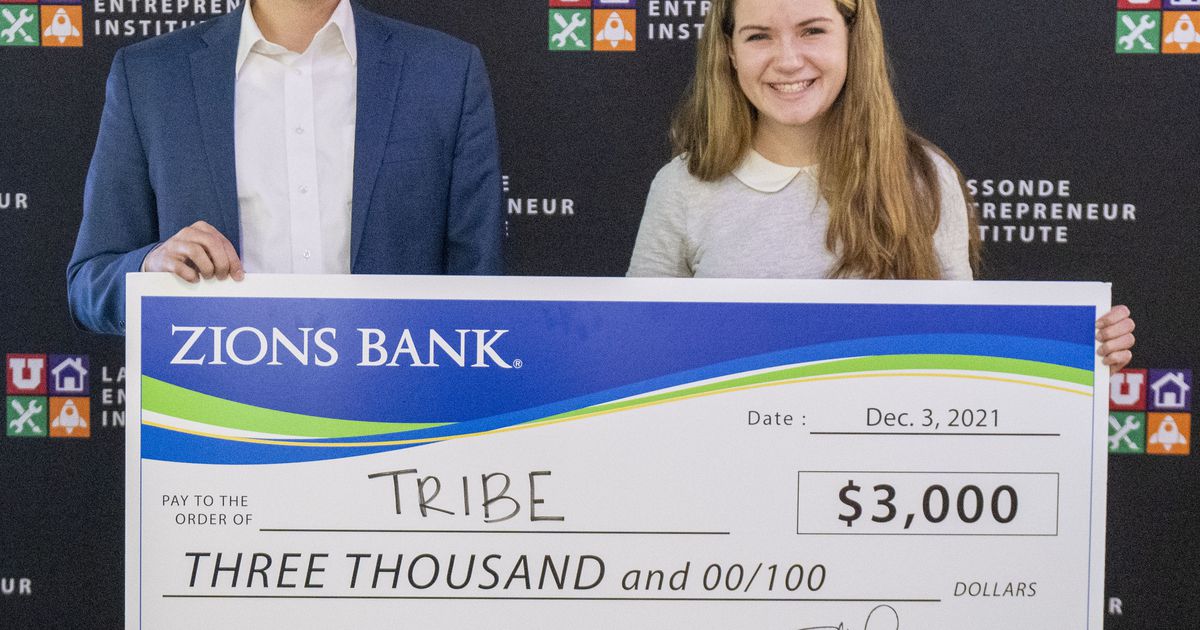Student-run app for addiction recovery wins $3,000 at University of Utah business contest

Ten finalists competed in the Opportunity Quest competition for prizes totaling $8,000
(Rick Egan | The Salt Lake Tribune) Nick Van Slooten and Elizabeth Miller, two of Tribe’s co-founders, took First Place in
in the Lassonde entrepreneur contest at the University of Utah, on Friday, December 3, 2021.
This story is part of The Salt Lake Tribune’s ongoing commitment to identify solutions to Utah’s biggest challenges through the work of the Innovation Lab.
[Subscribe to our newsletter here]
An addiction-recovery app run by college students won $3,000 in a business competition at the University of Utah.
Focused on helping people with pornography addictions, Tribe is an online community support group, co-founder Nick Van Slooten said. Van Slooten is a senior at Brigham Young University, but one of Tribe’s co-founders Elizabeth Miller is a junior at the U.
Ten finalists competed in the Opportunity Quest competition, hosted by the university’s Lassonde Entrepreneurship Institute. The University of Utah student-led businesses competed to win $8,000 in awards.
The institute, which is in its 20th year, supports any University of Utah student interested in entrepreneurship and starting a business. About 400 students live in a dorm formed to be an entrepreneurial community, but the institute works with thousands more students throughout the year, spokesman Thad Kelling said.
Judges included a partner with the University Growth Fund, Album VC, SEARCH Group Partners and law firm Ballard Spahr.
(Rick Egan | The Salt Lake Tribune) Elizabeth Miller and Nick Van Slooten took First Place in in the Lassonde entrepreneur contest at the University of Utah, on Friday, December 3, 2021.
Though launched with a focus of pornography addiction, Tribe hopes to expand to help people with other addictions.
“We want to be the platform for team-based accountability,” Van Slooten said. “An in-app support group for people to find a safe space to meet other people who are struggling or on the same journey.”
In the first three weeks since its launch in the Apple and Google app stores, about 100 people have signed up, paying $4 per month.
“The reason we charge is to get people who want to be on the platform,” Van Slooten said. “We tried a free beta [first run] and found that the critical thing is finding people who are really committed to engaging.”
Tribe, which Miller said would be renamed Relay in the coming weeks, will use the funds for marketing and advertising.
“We’re going to be able to reach more people,” Van Slooten said, adding that the company will place ads with online companies including Facebook and Google.
Laundry-on-demand service Foam Laundry placed second, winning $2,000. Students at the university can drop off one bag of laundry to Foam’s office in the Lassonde Studios business, and founder Carson Young or one of his employees will wash, dry, fold and deliver it all for $10 per week.
(Rick Egan | The Salt Lake Tribune) (Rick Egan | The Salt Lake Tribune) Carson Young in front of his business Foam Laundry, which took 2nd place in the Lassonde entrepreneur contest at the University of Utah, on Friday, December 3, 2021.
Young said he came up with the idea of Foam when he was a freshman who had never had to do his own laundry before.
“I was like, ‘Well, it’d be sick if I could just pay someone,’” Young said. “Fast forward to now, I’ve done more loads of laundry than you’ve ever seen.”
Foam has about 15 customers so far since launching at the beginning of the semester.
Aether Masks, co-founded by medical students at the U., placed third, winning $1,000 for its masks that won’t fog glasses. The company has already filed a patent for its new masks, which have padding on the nose that makes the mask more comfortable and prevents the wearer’s breath from escaping up toward the eyes.
“There are neurosurgeons using duct tape,” said co-founder Chance McCutcheon. “They’ve been doing it for decades, these DIY solutions to prevent fogging.”
Aether’s co-founders hope to license the design of its disposable masks to surgical mask manufacturers as well as a reusable design for day-to-day customers.







